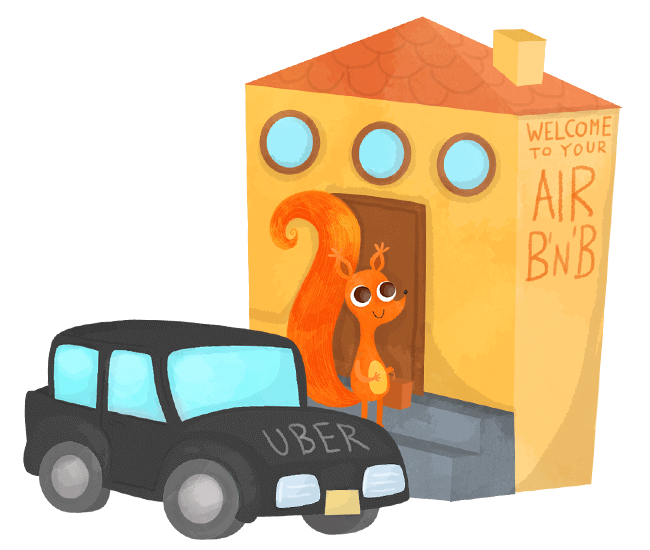
The gig economy may seem like a great way to supplement your income, but being unaware of the details could leave you at a loss. If you’re looking at ridesharing (driving for Uber) or homesharing (hosting on Airbnb) services, here are a few things to consider before taking the leap.
If Airbnb seems like a good idea, you’re right. Unlike other side hustles that exchange time for money, Airbnb wants to swap space for income. After taking photographs of your home, you post them on the site, write a description with details of your abode and Airbnb will do the marketing, process the transaction, and keep financial records to make tax time a breeze. There are some additional things you may want to consider when listing your property. You could put up some local artwork for an immersive experience, provide clean sheets and towels to enhance their stay, and maybe even add a key-less entry so they enjoy the anonymity of the experience. Oh, and remember to post the house rules to protect yourself, right?
Well, not really. Basic house rules are a recommended addition to any listing, but it does not mean your property is 100% in the clear, and while Airbnb does have insurance beware of the pitfalls. Airbnb provides host protection insurance which provides $1 million in liability coverage from your guests injuring themselves on your property. They also offer a $1 million host guarantee protection which covers property damage to your home. If you think that’s fine, there are two big reasons why it’s important to review your home insurance policy.
The first is knowing that not all home insurance policies are okay with you renting out your space. When you first combed through home insurance quotes in search of coverage that included protections from all perils, including fire and theft, you likely hadn’t considered homesharing and the implications it has on your coverage. Do you remember the last time you reviewed your coverage to look at the replacement value of your home? There are currently only a select few providers that cover homesharing in Canada, and they are Aviva, Duuo, April, and Square One.
If you’re not covered by one of these providers, and your own provider is not okay with you offering the service, it may be time to shop for new house insurance quotes that offer homesharing protection and take the time to understand their differences. Aviva covers you for lost rental income if you had to remove your listing for repairs due to a previous guest that trashed your place, but the Airbnb coverage does not. Duuo allows you to book insurance only when you need it and on top of your existing coverage with another provider. Aviva, on the other hand, wants to be your primary provider first, and they want a year-long contract.
If you feel intimidated, don’t be. Due diligence and proper research on your insurance options should put you at ease. Having the right insurance product allows you to put in the work knowing you’re protected in case of emergency.

Are you considering ridesharing services like Uber or Lyft for additional income? Among many things, you’ll want to make sure your car is clean and passenger friendly. Put yourself in the passenger seat, would you want to be offered mints, water bottles or access to music playlists? All of these considerations create a comfortable environment for your passengers.
When it comes to safety, you should be doing all of these things regularly regardless if you’re ridesharing: Engine checks, oil changes, tire pressure checks, and making sure you’re ready for the snow with those winter tires. Don’t forget to review your car insurance policy to safeguard yourself. The importance of having a conversation with your insurance provider can’t be stressed enough.
Insurers will often insert terms into their policies obliging you to disclose material changes to the risk. Simply put, by offering ridesharing, you’re changing the terms of your original contract and you need a conversation to disclose and discuss what you can and can’t do.
Your insurer may ask a few questions about how often you’ll be ridesharing. Knowing this information might just be enough. They may decide an increase in your premiums or even inform you that you’d be in breach of contract. If the situation dictates that you need to move on from your current insurer, make sure to get car insurance quotes from providers that allow for ridesharing services.
As with Airbnb, there are only a select few providers who explicitly offer car insurance for Uber and Lyft: Aviva, Intact, or Belair direct. Northbridge insurance offers coverage for other ride sharing services. Each ridesharing company offers fleet protection over and above your personal coverage via a commercial policy. Intact insures all of Uber’s fleet across Canada, wherever it’s offered, while Aviva protects Lyft drivers throughout Ontario.
Here’s how it works:
Before you turn the app on, you are protected under your own policy. Once the app is on, you are first protected by the ridesharing service and then your own policy. When you pick up a passenger and up until the time you drop them off, the liability coverage increases from $1 million to $2 million (except in Quebec where it remains $1 million).

It goes without saying that the gig economy is great. It allows you to set your own hours, work from home or abroad, and be your own boss. No one said running your own business is easy and the implications of not informing your insurance provider could have lasting impacts on your insurance. Consider all the risks, write out a pro’s and con’s list, and your side hustle could pave the way to faster financial freedom.
YOUR FREE FINANCIAL PLAN
The best financial plan is also the easiest.
Build your free plan today.
Start now